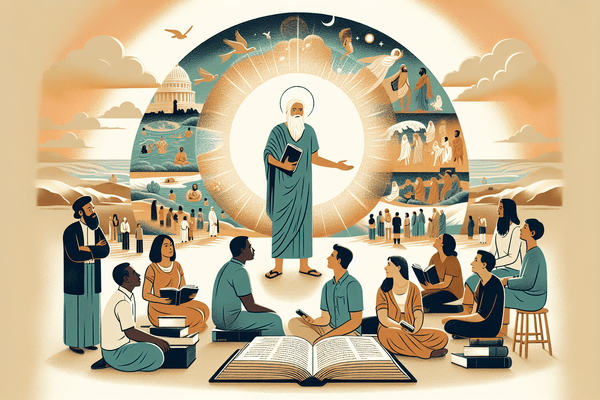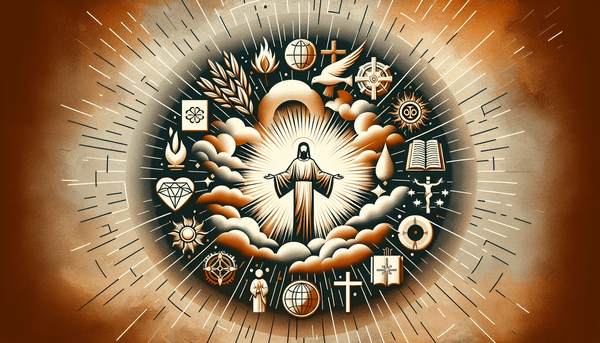The Creation of Humanity in Genesis
In the book of Genesis, we are presented with a profound declaration that humanity has been created in the image and likeness of God (Genesis 1:26-27). This notion of being made in the 'image of God' carries with it an intrinsic value and dignity, assigning humans a special place within the tapestry of creation. The narrative goes further to differentiate humanity as 'male and female,' a binary creation that has been interpreted through the ages to speak on gender and relationships. The Scriptures also establish humanity's role as stewards and caretakers of the earth, entrusted with dominion over all living creatures (Psalm 8:4-8). The creation of woman from man (Genesis 2:21-24) and the ensuing establishment of marriage are pivotal moments in the biblical creation story, underscoring the relational aspect of human existence and setting a precedent for discussions on familial and societal structures.
The Biblical View on Same-Sex Relationships
While the term 'LGBTQ+' is not explicitly mentioned in the Bible, there are passages that have been interpreted in various ways regarding same-sex relationships. The historical context of these scriptures is crucial to understanding their intent and implications. In the Old Testament, Leviticus 18:22 states a prohibition against same-sex relations, which is echoed in the New Testament in Romans 1:26-27, where Paul speaks of certain actions as being contrary to nature. The debate among different denominations today revolves around interpretations of such passages and how they apply in contemporary society. In this discourse, the Christian mandate to love one's neighbor (Mark 12:31) is often juxtaposed with the call to live according to biblical teachings. The story of Jesus admonishing those ready to cast judgment in John 8:7 is a powerful reminder of the centrality of compassion within the faith.
The Existence and Reality of God
The question of God's existence is one that has been pondered by humankind throughout the ages. Within the Christian tradition, the reality of God is accepted through faith and divine revelation. The natural world, in its complexity and beauty, is seen as evidence of a divine Creator (Romans 1:20). The Bible itself affirms God as the Creator of the heavens and the earth (Genesis 1:1), a truth that is foundational to Judeo-Christian belief. This belief is further reinforced by the depiction of God's Word being active in creation (John 1:1-3) and the heavens declaring the glory of God (Psalm 19:1). Faith in God's existence is a journey that begins with belief and is bolstered by the profound sense of order and design present in the universe. To further explore how the narrative of Jesus Christ weaves into this divine tapestry, consider reading about the inauguration of Christ's kingdom, rewards, transformation, and hope.
The Composition of the Bible
The Bible as we know it comprises a collection of books that have been canonized over centuries. Notably, the Protestant and Catholic traditions differ in the number of books recognized as canonical, with the Catholic Bible including the Apocrypha, a set of writings accepted by some but not all Christian denominations. The interplay between the Old and New Testaments is also significant, as Jesus referenced the law of Moses, the Prophets, and the Psalms (Luke 24:44), highlighting the continuity and fulfillment of scripture. The Bible itself emphasizes the importance of its teachings, with passages such as 2 Timothy 3:16 which declares all Scripture as God-breathed, and warnings in Revelation 22:18-19 against altering the sacred text. Such verses underscore the reverence with which the Bible is to be approached and the diligence required in its interpretation.
Conclusion
The teachings and narratives of the Bible continue to engage the minds and hearts of those who seek understanding and guidance. From the origin stories that shape our perception of humanity's place in the cosmos to the directives that challenge us to reflect on our relationships and conduct, the Bible remains a profound source for contemplation. As we navigate the complexities of interpreting these ancient texts in the context of our modern lives, it is essential that we approach them with both reverence and a willingness to explore their depths. In doing so, we honor the rich tradition of theological inquiry and open ourselves to the wisdom that has guided generations before us. For those grappling with the timing of God's plan or seeking reassurance, finding strength and peace in God's timing and truth can offer comfort and encourage a deeper trust in the providence of God.






